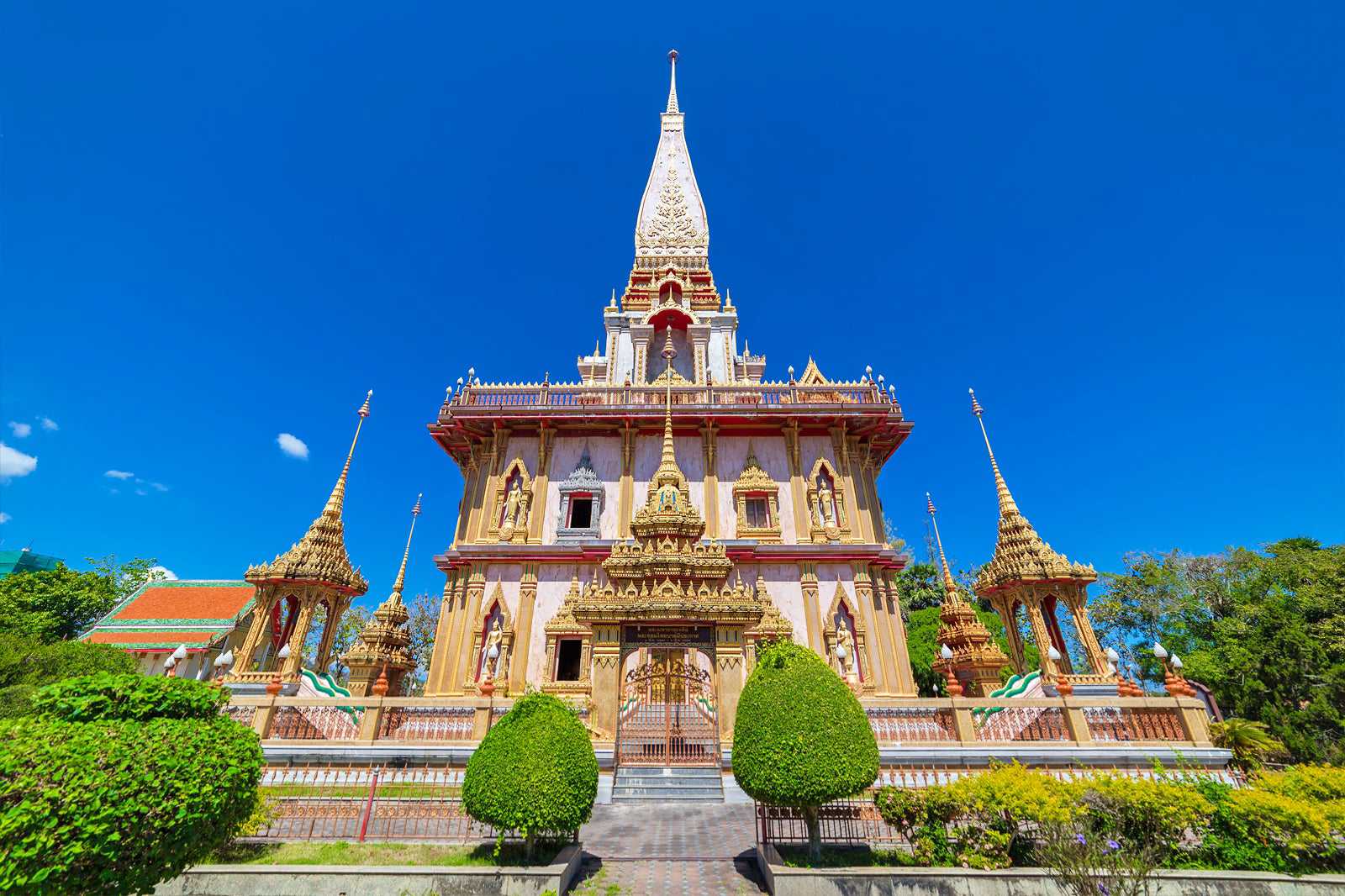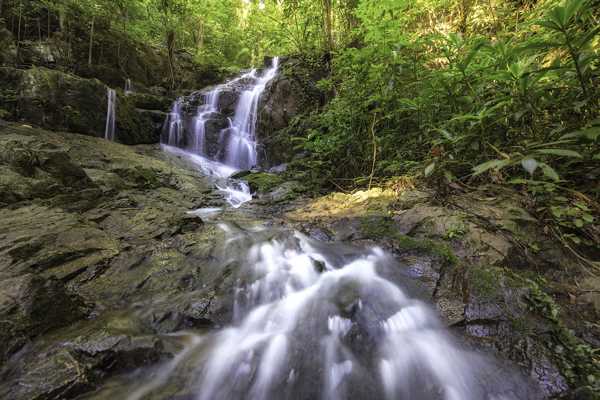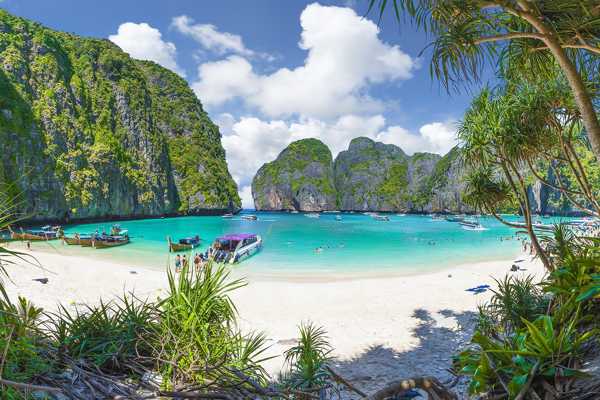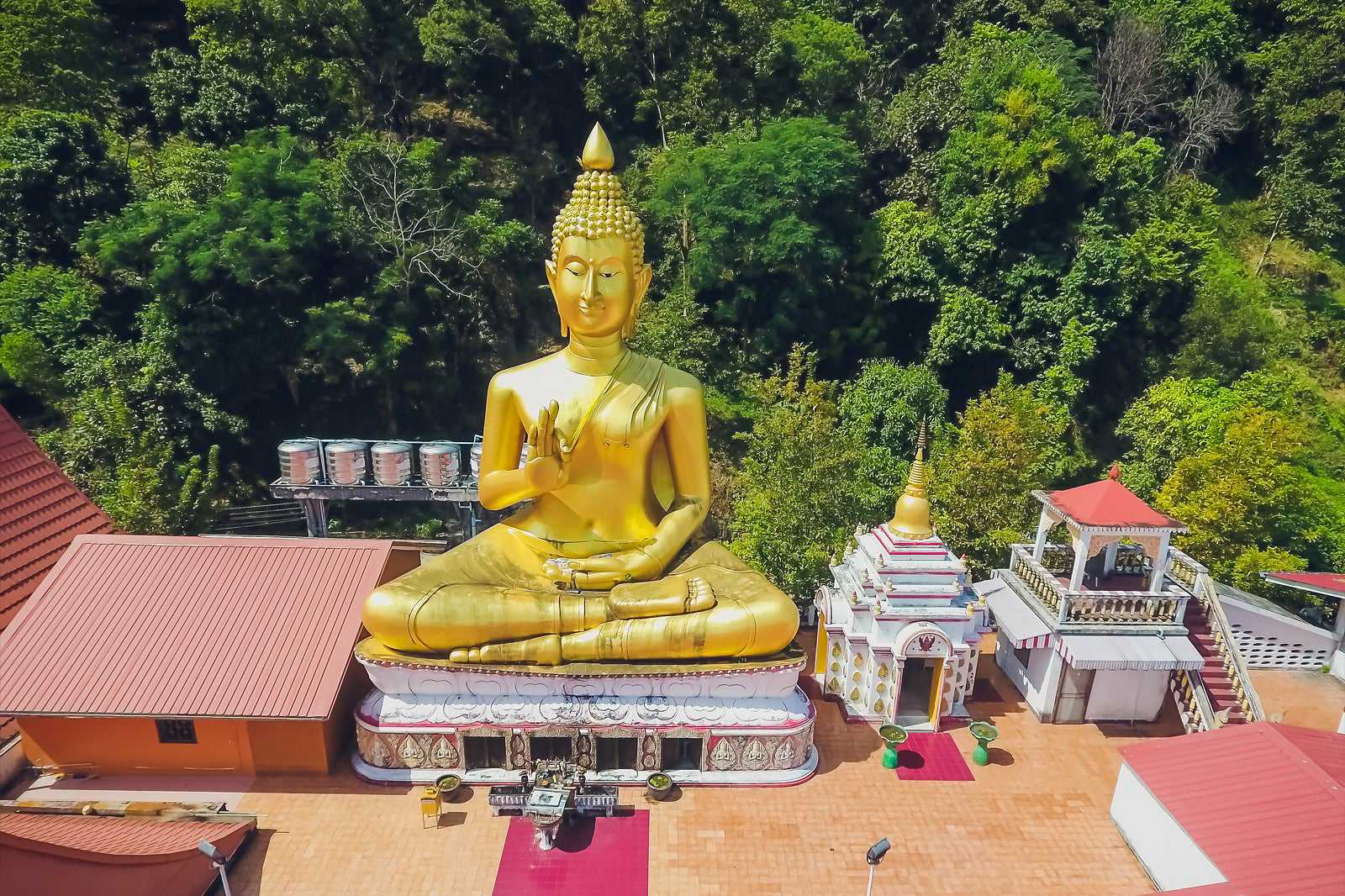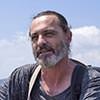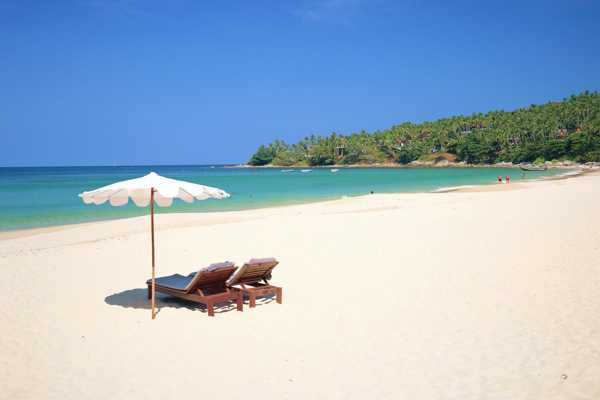Our list of the must-see temples in Phuket comprises wats (Buddhist temples) and Chinese shrines (Taoist temples). Wats are among the most important symbols of Thailand, partly because the majority of Thais are Buddhist but also because they are so beautiful. In Phuket alone, there are more than 25 Buddhist temples spread around the island.
Chinese shrines also have great importance in Thailand, especially Phuket due to the Chinese community that migrated to Thailand through the centuries. There are as many Chinese shrines as wats in Phuket, so you are sure to find a colourful and interesting temple near to where you are staying. Here are some of the best in Phuket and the neighbouring Phang Nga Province.
- Budget
- History
Read moreWat Chalong is dominated by the Grand Pagoda, which is said to contain a splinter of Lord Buddha's bone. Officially named Phramahathatchedi-Jomthaibarameepragat, the pagoda is decorated with wall paintings depicting the Buddha's life story and also features various Buddha images. Take your time in the pagoda – it's a breezy, cool location and one which is very popular with visitors to the temple.
Location: 6 Chao Fah Tawan Tok Rd, Chalong, Muang, Phuket 83000, Thailand
Open: Daily from 7 am to 5 pm
Phone: +66 (0)76 381 226
Map- Budget
- History
Read morePhuket's Big Buddha is one of the island's most important and revered landmarks on the island. The huge image sits on top of the Nakkerd Hills between Chalong and Kata. At 45 metres tall, it's easily seen from far away. The lofty site offers panoramic views of the island, with sweeping vistas of Phuket Town, Kata, Karon beaches, and Chalong Bay. Easily reachable via a 6-km road leading from Phuket's main artery route, the temple is a must-visit for all first-timers on the island.
Location: Soi Yot Sane 1, Karon, Muang, Phuket 83100, Thailand
Open: Daily from 6 am to 7 pm
Phone: +66 (0)81 891 3827
Map- Budget
- History
Read moreWat Khao Rang (or Sumnak Song Khao Rang) enjoys a great location in Phuket Town, on the slope of the popular Rang Hill. The spiritual centre of the island for many locals, this temple was the home of the first big Buddha image on the island. The grounds of Wat Khao Rang are divided into 2 areas – the original building supporting the sitting Buddha on its roof (with its back against the green hillside) and another temple next to it.
Location: Khao Rang Hill, Muang, Phuket 83000, Thailand
Open: Daily from 8 am to late-afternoon
Phone: +66 (0)76 222 520
Map- Budget
- History
Read moreJui Tui Shrine is a popular Chinese temple that plays a pivotal part in the annual Phuket Vegetarian Festival. Located on Soi Phuthorn, Ranong Road, not far from Phuket’s main market, it’s a must-see site for all newcomers to Phuket as one of the oldest and the most respected spiritual centres around.
Throughout the temple grounds, you can see photos of the temple dating back to 1911 when it was just a single, stand-alone construction without side buildings or walls.
Location: 283 Soi Phutorn, Talat Nuea, Muang, Phuket 83000, Thailand
Open: Daily from 8 am to 8.30 pm
Phone: +66 (0)76 213 243
Map- Budget
- History
Read moreWat Phra Thong is a small but interesting temple in Thalang. Its main attraction is the half-buried golden Buddha image, which is said to be untouchable as every person who has tried to dig it out is reported to have been cursed. Legend has it that a boy who tied his buffalo to an object that looked like a post fell ill and died, along with the buffalo. His father went to check the post and it turned out to be part of a buried Buddha image. One of the island’s oldest temples, it received a visit in 1909 by King Rama VI, who gave it its official name.
Location: Thep Krasatti, Thalang, Phuket 83110, Thailand
Open: Daily from 8 am to 5.30 pm
Phone: +66 (0)93 621 4687
Map- Budget
- History
Read moreWat Srisoonthorn, known by locals as Wat Lipon, is in Thalang, north of Phuket Town. The first thing you'll see when entering the temple is a 29-metre-high sleeping Buddha on top of the wat’s central building – it's so large that it's noticeable from the road outside. You'll also notice that there are quite a few non-Buddha images, including a giant and lions, which come from Thai myths. They're believed to act as the temple’s guards. Other interesting images are of phets (ghosts). Some Thais believe that if one does bad things, you'll end up being a phet in the afterlife. It’s the main reason why many wats have this ghostly image – to remind people to be kind to others.
Location: 20/4 Thepkrasatree Rd, Si Sunthon, Thalang, Phuket 83110, Thailand
Open: Daily from 7 am to 5.30 pm
Phone: +66 (0)98 017 8044
Map- 7
Wat Phra Nang Sang

- Budget
- History
Phra Nang Sang Temple is located just before the Thalang intersection near Baan Ta-Kien, opposite the entrance of Khao Pra Taew Wildlife Conservation Centre. Rumoured to be over 500 years old, it’s one of the oldest temples on the island. The story goes that the temple was built in honour of an innocent princess who was executed for a crime she did not commit. At her execution, it’s claimed that she bled white blood, thus showing her purity. For this reason, the temple is also called Wat Leuat Khao (Temple of the White Blood).
Location: 330 Ton Sai Nam Tok Road, Thep Krasatti, Thalang, Phuket 83110, Thailand
Phone: +66 (0)76 311 084
Map - 8
Wat Suwan Khuha

- Budget
- History
Wat Suwan Khuha is also called Wat Tham or simply 'temple cave' because that’s where it’s located – inside a limestone cave. The largest part of the caves houses a 15-metre reclining Buddha image. It's also decorated with attractive Benjarong (Thai-style) tiles.
There's a chedi structure reminiscent of Bangkok’s famous Temple of the Dawn (Wat Arun) along with a small grotto with a golden stupa. Care should be taken here as the temple has a sizeable and rather aggressive monkey population, prone to grabbing snacks off visitors and messing with car antennas. Apart from the naughty monkeys, this is a pleasant place to visit.
Location: 36/1 Phet Kasem Rd, Krasom, Takua Thung, Phang-Nga 82130, Thailand
Phone: +66 (0)76 450 333
Map - 9
Kiew Tien Keng Shrine

- Budget
- History
Kiew Tien Keng is a beautiful shrine at Saphan Hin Park in Phuket Town. It’s the only shrine that's located near the seashore and is considered the departure spot to send all gods/deities back to heaven on the final night of the Vegetarian Festival. The colourful parades of each shrine officially come to an end at this temple.
Location: Saphan Hin Park, Soi Bang Yai, Wichit, Muang, Phuket 83000, Thailand
Map - 10
Kathu Shrine

- Budget
- History
Kathu Shrine is known as the original home of Phuket’s Vegetarian Festival. Rumour has it that a Chinese opera from mainland China came to town and, without any particular reason, members of this group started to fall ill. After a while, they realised that they had forgotten to carry on with their important traditional vegetarian diet. Finally, they held a vegetarian diet ceremony at their temporary opera house in Kathu and all the sickness and problems amazingly disappeared. Locals carry on this tradition by celebrating the annual Vegetarian Festival Phuket is known for.
Location: Samkong-Kathu Rd, Kathu, Phuket 83120, Thailand
Map - 11
Wat Suwan Khirikhet

- Budget
- History
Founded in 1895, Wat Suwan Khirikhet (also called Wat Karon) is the only temple in Karon Beach. This small but attractive landmark is easy to find and worth a visit. It's most noteworthy for hosting a night market on Tuesday and Friday evenings.
The main building is guarded by 2 large, emerald-green nagas (serpents) and the interior of the building's walls, doors and window panels depict the life of Buddha, including his struggle with evil before achieving enlightenment. A smaller building houses 2 Ramayana images guarding a beautiful black sapphire Buddha image.
Location: 1 Patak Rd, Karon, Muang, Phuket 83100, Thailand
Map - 12
Wat Baan Kamala

- Budget
- History
Wat Baan Kamala is a classic Buddhist temple located on Kamala's beachfront, towards its southern end. Entirely rebuilt and renovated after Phuket's deadly tsunami in 2004, the temple occupies a nicely landscaped garden with an ordination hall, a bell tower, monks’ dormitory and refectory, along with 2 small constructions housing Buddha images and statues. The best time to visit Wat Baan Kamala is in the late afternoon when it's softly illuminated by golden sun rays.
Location: 16/32 Rim Hat Rd, Kamala, Kathu, Phuket 83120, Thailand
Map - Budget
- History
Read moreWat Putta Mongkon (also spelt Wat Buddhamongkol) has beautiful architectural features. This includes a yellow chedi (pagoda), a small bell tower and a Sino-colonial mansion used as a dormitory for the temple monks.
There are 2 ways to enter this wat; by Thepkasatri Road or by Dibuk Road, opposite the famous Soi Romanee. It's often referred to as Wat Klang ('centre temple' in Thai) because of its location in the heart of Phuket Town.
Location: Dibuk Road, Talat Yai, Muang, Phuket 83000, Thailand
Open: Daily from 7 am to 5.30 pm
Map- 14
Wat Kajonrangsan

- Budget
- History
Wat Kajonrangsan, or Wat Kajon for short, is an unusual Buddhist temple in terms of design. The main building (or pra u-bosod) has a Roman-style architecture, which is unique in Phuket. It also has a beautiful set of Thai-style pagodas.
If you visit between 7am and 8am, you'll come across quite a busy place. This is because Wat Kajonrangsan School is located within the same compound. It might be fun to be there early to observe the traditional Thai way of life, where the temple is at the heart of everything, including education.
Location: 26 Moo 1, Talat Nuea, Muang, Phuket 83000, Thailand
Open: Daily from 7 am to 5.30 pm
Map - 15
Wat Kathu

- Budget
- History
Wat Kathu sits on a hill by the side of Wichitsongkram Road in Phuket. It's divided into 3 levels – the top level is home to all religious buildings, the second level is for the monks’ dormitory, and the lowest one has an orchard (mainly coconuts), kitchen, and visitors’ shelter.
Wat Kathu is known for housing the antique image of Lung Por Mai Reab, considered a holy object by Kathu residents. Over the years, the local government has also used Wat Kathu as a training centre for different subjects such as culture, health and careers.
Location: Wichitsongkram Rd, Kathu, Phuket 83120, Thailand
Open: Daily from 7 am to 5.30 pm
Map - 16
Wat Kosit Wihan

- Budget
- History
Wat Kosit Wihan is among the most revered temples in Phuket. It's over 140 years ago on the edge of a national park hill just north of Phuket Town. At the centre of the temple is the shrine hall, where most religious ceremonies take place. This beautiful building, with its triple roofs, gets busy during important Buddhist holidays.
Wat Kosit’s grounds are full of tropical trees and interesting flowers. Important images around the temple include the golden laughing Buddha statue and a statue of Lung Por Lod, the temple’s first abbot.
Location: 228 Moo 6, Thepkrasatree Rd, Talat Yai, Muang, Phuket 83000, Thailand
Open: Daily from 7 am to 5.30 pm
Map - Budget
- History
Read moreWat Mai Luang Pu Supha (Wat Sila Suparam) in Chalong is famous mainly because of its founder, Luang Pu Supha, one of the most respected and long-lived monks in modern Thai history. He lived to be over 118 years old.
Luang Pu Supha dedicated a large part of his life (almost a century to be exact) to being a Buddhist monk, spreading the word of dharma and building almost 40 temples and monasteries around the country – 3 of which are in Phuket.
Location: Chaofa West Rd, Chalong, Muang, Phuket 83000, Thailand
Map- 18
Wat Sawang Arom

- Budget
- History
Wat Sawang Arom is a small but ornate temple that serves the Buddhist community of Rawai and nearby villages. Inside, you can see traditional Buddha images and paintings depicting his life. A school is adjacent to the temple – visit in the morning to see local students playing before it's time for class. Dress conservatively as this is a holy place for Buddhist Thais.
Location: 3/10 Wiset Road, Rawai, Muang, Phuket 83100, Thailand
Open: Daily from 9 am to 6 pm
Map - 19
Wat Cherngtalay

- Budget
- History
Wat Cherngtalay has been the spiritual centre of the village for over 100 years (though it was relocated to its current location in the 1970s). The temple consists of 5 large buildings – 3 of them dedicated to religious services, while the other 2 are the monks’ dormitory and their refectory.
Featuring traditional Thai temple architecture and decoration, Wat Cherngtalay also blends Buddhism and Hinduism. Inside the ordination hall, you can see a fresco depicting the life of Siddharta Gautama (Buddha). Outside the temple, you can see a large painting representing Ganesha, the elephant-headed god of success. Mantras are all written in Sanskrit. Tranquil and beautiful, Wat Cherngtalay is a fine place to visit in the Bangtao area.
Location: 2 Soi Cherngtalay 6, Cherngtalay, Thalang, Phuket 83110, Thailand
Map - Budget
- History
Read moreWat Bang Riang (formally Wat Rat Upatam) is a beautiful hilltop temple on Khao Lan Mountain in Thap Put, Phang Nga Province. The temple features a seated golden Buddha image, a large statue of Kwam Im (Guan Yin), the Chinese Goddess of Mercy, as well as fine Thai temple architecture.
A drive through the rustic countryside in which the temple resides can be very interesting, despite it not being on the usual travellers’ beaten path. Even so, it’s well worth a visit if you have time to spare while in Phang Nga.
Location: Bang Riang, Thap Put, Muang, Phang-nga 82000, Thailand
Open: Daily from 9 am to 5 pm
Map- Budget
- History
Read moreWat Tham Ta Pan is one of the weirdest original temples in southern Thailand. Located in Phang Nga Town, approximately 100 km northeast of Phuket, the site offers a graphic journey through Buddhist Heaven and Hell. At first sight, the temple looks a bit abandoned and decrepit, which simply adds to the spookiness of the place.
Location: 79 Soi Tham Ta Pan 5, Tham Nam Phut, Muang, Phang-Nga 82000, Thailand
Open: Daily from 8.30 am to 6 pm
Map
